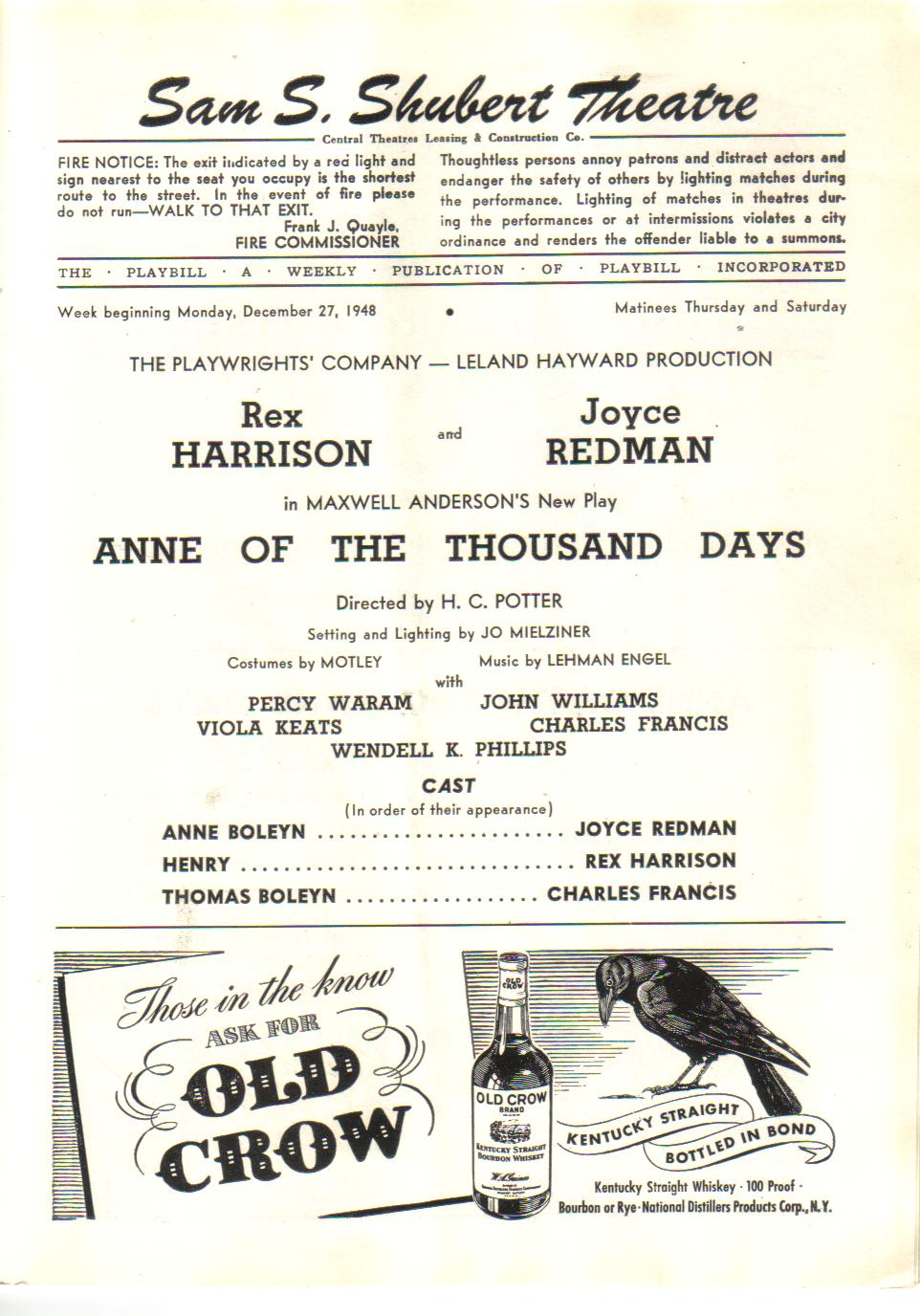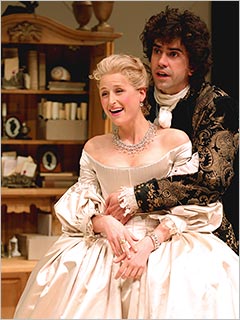 Over the weekend I flew down to Winter Park, Florida, to deliver the commencement address at Rollins College’s Hamilton Holt School. Having spent the past two winters as a scholar-in-residence at the Winter Park Institute and given a half-dozen lectures and other public presentations at Rollins, I’ve become a modestly familiar face on campus, and Mrs. T and I now feel very much at home there. This, however, was the first time that I’d taken part in an official college function. It was also my first stint as a commencement speaker, as well as the first time that I’d been present at a graduation since I received my own college diploma some thirty-two years ago. Rollins, I found, puts on quite a show: not only was I decked out in full academic regalia, but the dignitaries with whom I shared the platform marched from the president’s office to the auditorium, accompanied by a pair of kilted pipers. Rarely have I felt so regal.
Over the weekend I flew down to Winter Park, Florida, to deliver the commencement address at Rollins College’s Hamilton Holt School. Having spent the past two winters as a scholar-in-residence at the Winter Park Institute and given a half-dozen lectures and other public presentations at Rollins, I’ve become a modestly familiar face on campus, and Mrs. T and I now feel very much at home there. This, however, was the first time that I’d taken part in an official college function. It was also my first stint as a commencement speaker, as well as the first time that I’d been present at a graduation since I received my own college diploma some thirty-two years ago. Rollins, I found, puts on quite a show: not only was I decked out in full academic regalia, but the dignitaries with whom I shared the platform marched from the president’s office to the auditorium, accompanied by a pair of kilted pipers. Rarely have I felt so regal.
My seat was directly behind that of Lewis Duncan, the president of Rollins College. This meant that I got a good look at all the students who received diplomas. I had no idea how moving an experience this would prove to be. The Holt School is Rollins’ night-school division, the place where you go if you want to earn a college degree while holding down a full-time job. The men and women to whom I spoke ranged widely in age–one was in his seventies–but most of them were young enough to look like ordinary college graduates. Appearances, however, can be deceiving, for you have to work fearfully hard to get a diploma after hours, and each and every person to whom President Duncan said “Well done!” on Saturday morning had in fact done something for which the word “extraordinary” is far too mild. I’ve never seen so many proud and hopeful faces lined up in a row. I don’t mind admitting that I teared up more than once as I listened to the cheers of the friends and family members who had come to celebrate their collective achievement.
What can you possibly say to such remarkable people on so auspicious an occasion? Here’s part of what I told them. They seemed to like it, and I hope you do, too.
* * *
One more story and I’m done. Since I’m a drama critic, I’ll make it a Broadway story. It’s about Leland Hayward, who used to be a big Broadway producer. He was going to put on a play by Maxwell Anderson called Anne of the Thousand Days, and he asked Anderson who should play Henry VIII. Anderson gave it some thought, then he played it safe and suggested a good, solid actor with no flair, no panache.
 Hayward got red in the face, banged on the desk, and said, “No, no, Max! Suppose there were absolutely no problems in getting anyone in the world you wanted. Who would you pick?”
Hayward got red in the face, banged on the desk, and said, “No, no, Max! Suppose there were absolutely no problems in getting anyone in the world you wanted. Who would you pick?”
Anderson didn’t hesitate for a moment. He said, “Rex Harrison–but you’ll never get him.”
And Hayward grinned and said, “Why not ask him?” He picked up the phone and started placing calls, and an hour later, Rex Harrison had agreed to play Henry VIII.
Then Hayward hung up, grinned again, and said, “There’s a lesson in this, Max. Never start out asking for someone you’d eventually settle for.”
You see the point. If there’s ever a time in life for you to shoot high, it’s now. So take a long, cool look at yourself and say, What do I really want out of life? What would keep me interested until the day I die? Do I have a realistic chance to get it? And if you think you do, then go for it. Work as hard to get it as you worked to get your degree here. Settle later, if you must–but don’t spend the rest of your life eating your heart out because you didn’t give it your very best shot right now.
Archives for 2011
TT: Almanac
“I read the newspapers with lively interest. It is seldom that they are absolutely, point-blank wrong. That is the popular belief, but those who are in the know can usually discern an embryo truth, a little grit of fact, like the core of a pearl, round which have been deposited the delicate layers of ornament.”
Evelyn Waugh, Scoop
TT: Flying couplets and flying canapés
David Ives and the Classic Stage Company have a hit on their hands with The School for Lies, which I review in today’s Wall Street Journal. Here’s an excerpt.
* * *
When not writing plays of his own, David Ives writes plays based on the works of other men. Sometimes, as in his English-language version of Georges Feydeau’s “A Flea in Her Ear” or the many musical-comedy books that he has freshened up for City Center’s “Encores!” series, these are more or less straightforward adaptations meant to make the works on which they are based more accessible to modern audiences. “The School for Lies” is something else again, an uncategorizable rewrite of Molière’s “The Misanthrope” in which Mr. Ives has done the seemingly impossible: He has taken a beloved masterpiece of Western theater and created a parallel version which, though unmistakably based on the original, is both wholly personal in tone and similarly dazzling in effect.
 At the center of both plays is a disillusioned curmudgeon (called Alceste by Molière and Frank–a nice touch–by Mr. Ives) who has resolved to tell the truth to everyone he meets, no matter how disconcerting or offensive they may find it. This being a comedy, Frank (Hamish Linklater) is diverted from his high-minded path by his love for Celimene (Mamie Gummer), an aristocrat with an equally sharp tongue. In “The School for Lies,” though, Mr. Ives transplants into “The Misanthrope” the fully articulated plot that Molière eschewed, showing how Frank and Celimene fell for one another in the first place, in the process transforming what began life as a high comedy of bad manners into a slapstick-laden farce whose flavor is more Anglo-Saxon than French.
At the center of both plays is a disillusioned curmudgeon (called Alceste by Molière and Frank–a nice touch–by Mr. Ives) who has resolved to tell the truth to everyone he meets, no matter how disconcerting or offensive they may find it. This being a comedy, Frank (Hamish Linklater) is diverted from his high-minded path by his love for Celimene (Mamie Gummer), an aristocrat with an equally sharp tongue. In “The School for Lies,” though, Mr. Ives transplants into “The Misanthrope” the fully articulated plot that Molière eschewed, showing how Frank and Celimene fell for one another in the first place, in the process transforming what began life as a high comedy of bad manners into a slapstick-laden farce whose flavor is more Anglo-Saxon than French.
All this is far more than clever enough–one expects no less from so accomplished a farceur–but what makes “The School for Lies” so memorable is its author’s virtuosic use of language. Like “The Misanthrope,” “The School for Lies” is written in rhyming couplets, and Mr. Ives, an amateur poet of no mean accomplishment, has got a million of ’em. What’s more, it was his ingenious conceit to write his play not in a pastiche of pseudo-French circa 1666 (the year in which “The Misanthrope” was written and “The School for Lies” is set) but in a completely contemporary English that derives much of its sparkling charm from being pressed into the incongruously tight mold of iambic pentameter….
Brilliant though “The School of Lies” is, it’s Walter Bobbie’s apply-foot-A-to-banana-peel-B staging that makes the play take wing. Mr. Bobbie, who speaks Mr. Ives’ idiosyncratic theatrical language fluently, is very much in tune with the high-low contrasts that drive “The School of Lies,” and has put together a cast that pushes every comic button at all the right moments. Mr. Linklater froths with the violent hauteur of a man who does nothing but suffer fools all day long…
* * *
Read the whole thing here.
TT: Almanac
“Writers are idolized not because they love their fellow men, which is never a recommendation and in extreme instances leads to crucifixion, but because their self-love is in tune with current fears and desires, and in giving it expression they are speaking for an inarticulate multitude.”
Hugh Kingsmill, The Progress of a Biographer
TT: So you want to see a show?
Here’s my list of recommended Broadway, off-Broadway, and out-of-town shows, updated weekly. In all cases, I gave these shows favorable reviews (if sometimes qualifiedly so) in The Wall Street Journal when they opened. For more information, click on the title.
BROADWAY:
• Anything Goes (musical, G/PG-13, mildly adult subject matter that will be unintelligible to children, closes Jan. 8, reviewed here)
• Born Yesterday (comedy, G/PG-13, closes July 31, reviewed here)
• The House of Blue Leaves (serious comedy, PG-13, closes July 23, reviewed here)
• How to Succeed in Business Without Really Trying (musical, G/PG-13, perfectly fine for children whose parents aren’t actively prudish, reviewed here)
• The Importance of Being Earnest (high comedy, G, just possible for very smart children, closes July 3, reviewed here)
• Million Dollar Quartet (jukebox musical, G, reviewed here)
• The Motherf**ker with the Hat (serious comedy, R, adult subject matter, closes June 26, reviewed here)
OFF BROADWAY:
• Avenue Q (musical, R, adult subject matter and one show-stopping scene of puppet-on-puppet sex, reviewed here)
• The Fantasticks (musical, G, suitable for children capable of enjoying a love story, reviewed here)
• Play Dead (theatrical spook show, PG-13, utterly unsuitable for easily frightened children or adults, reviewed here)
CLOSING SOON ON BROADWAY:
• Lombardi (drama, G/PG-13, a modest amount of adult subject matter, closes May 22, reviewed here)
CLOSING NEXT WEEK IN LOS ANGELES:
• God of Carnage (serious comedy, PG-13, Los Angeles remounting of Broadway production with original cast, adult subject matter, closes May 15, Broadway run reviewed here)
TT: Almanac
“The reward of renunciation is some good greater than the thing renounced. To renounce with no vision of such a good, from fear or in automatic obedience to a formula, is to weaken the springs of life, and to diminish the soul’s resistance to this world.”
Hugh Kingsmill, Matthew Arnold
TT: Snapshot
A rare kinescope of the séance scene from Noël Coward’s Blithe Spirit, originally telecast live on CBS in 1956. The cast includes Coward, Lauren Bacall, and Claudette Colbert:
(This is the latest in a weekly series of arts-related videos that appear in this space each Wednesday.)
TT: Almanac
“A melancholy lesson of advancing years is the realisation that you can’t make old friends.”
Christopher Hitchens, Hitch-22
